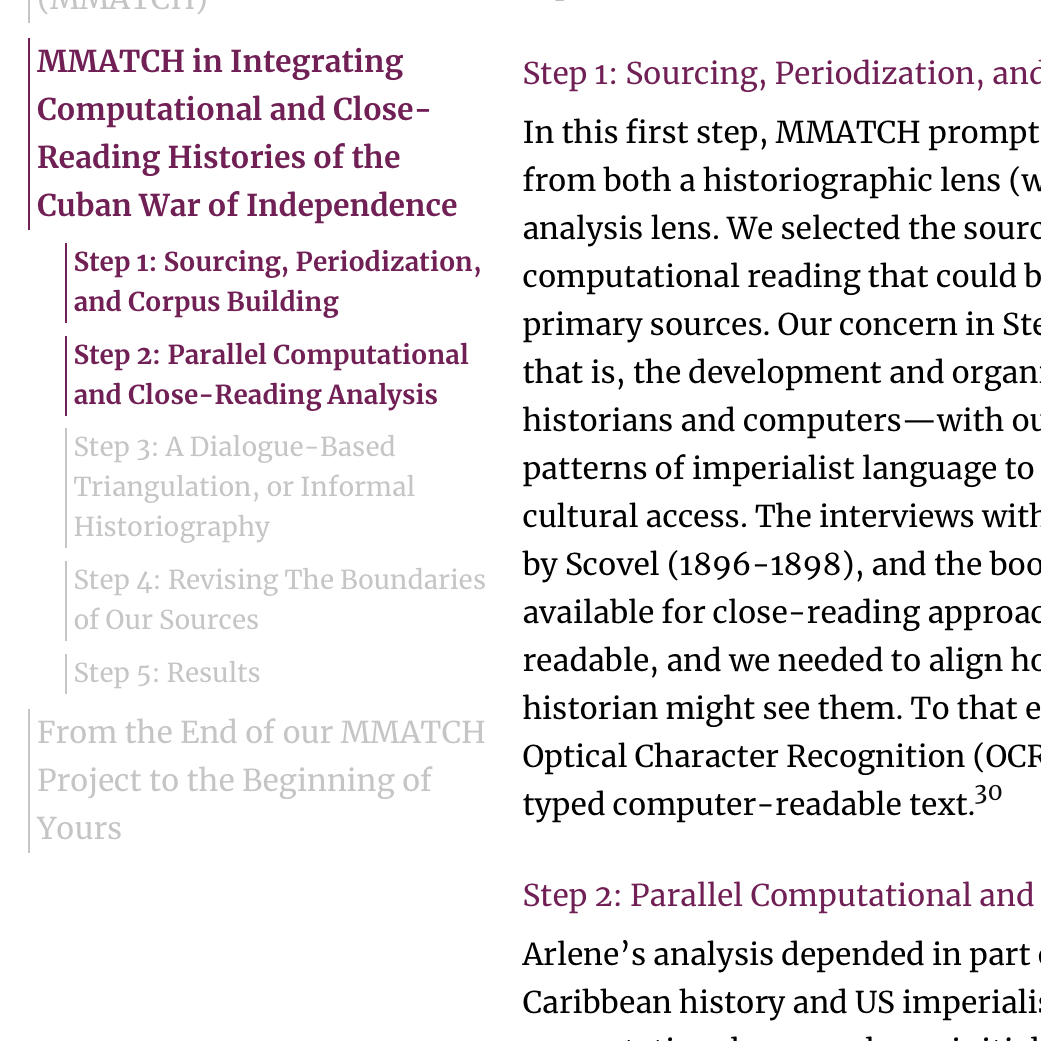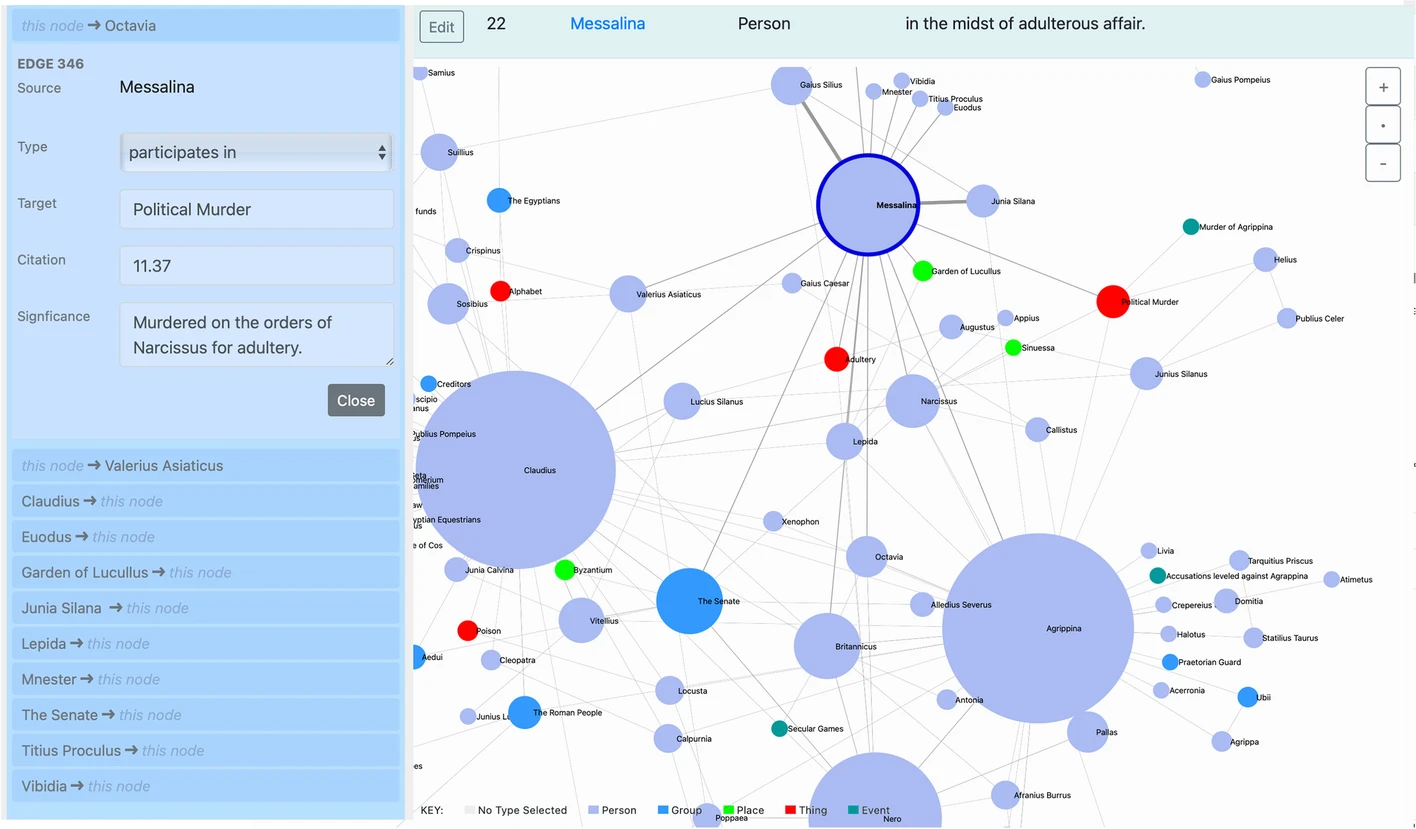
About Mixed Method Approaches to Collaborative History (MMATCH)
Mixed Method Approaches to Collaborative History (MMATCH) is a mixed-methods approach that started with my own work in computational text analysis and has developed into a collaboration process that emphasizes transparency and positionality. The five-step MMATCH methodology systematically navigates a revision and integration process of writing that moves between traditional close-reading historical analysis and new analytical methods. As part of that systematic process, it simultaneously accommodates the voices of multiple authors.
MMATCH and Computational Text Analysis as a DBHR Project
The world of text mining—particularly low-barrier-to-entry topic modeling with MALLET and work with AntConc or NTLK—opens up a whole variety of analytical options for scholars interested in pursuing computational text analysis. The reality of the data landscape for digital humanists, though, is that many digitized and transcribed texts have very restrictive copyright and usage guidelines that limit applications of text mining, hGIS and network-theoretical approaches. In these instances, full-text download and off-the-shelf analysis are often not an option. In these cases, in-text citations become an absolutely vital part of the digital analysis. However, readily available topic modeling tools like MALLET strip the citation data scholars, digital and analog alike, need to participate in a scholarly debate.
This citational concern was the initial platform for a Workflow for Paywalled Texts that documents the cleaning and treatment of digitized texts that preserves the original word order and citations so that scholars of both traditional and digital-methods persuasions can recreate the process.
Work with other historians and humanists at Indiana University on citation preservation in computational text analysis fostered several collaborations, one of which became the full articulation of MMATCH in an article submitted in 2022 and forthcoming in 2023.
Full Funding & Publication List
Text Based Publications
2023
Arlene Diaz and Kalani Craig with David Kloster, "A Diachronic Conversation with 19th Century War Correspondents and 21st century Historians: digital history, archival deep-dives, and US imperialism in Cuba’s Second War of Independence" (forthcoming, Dec 2022)
https://apps.iu.edu/edo-prd/EdoDownloadFile.do?itemID=362180&nid=Research-Creative-Activity_1_7.Presentations
Invited Talks & Workshops
2017
"Citation Preservation as a Tool to Open Paywalled Sources to Computational Analysis for Novice Digital Humanities Practitioners" at Translation Studies and/in the Digital Humanities, sponsored by The Centre for Translation Technologies at Chinese University of Hong Kong, (Hong Kong), June 12-13 2017.
Conference Presentations
2018
"Modeling Memories of Conflict: Understanding Memory and Space in Medieval Biography Using Corpus Linguistics and Network Analysis" at the 132st annual meeting of the American Historical Association (Washington, DC), January 7, 2018.
2017
"Min(d)ing the Gap: Citation Preservation as a Tool to Open Paywalled Sources to Computational Analysis" at the 131st annual meeting of the American Historical Association (Denver, CO), January 6, 2017.
2016
"Holy Bishops, Holy Memories, Holy Spaces: A Digital Exploration of Descriptions of the Built Environment in Saints’ Miracles and Memorials" at the 55th meeting of the Southeastern Medieval Association, Knoxville, TN, October 6, 2016.
"Between Miracles and Memory: Construction of Authority in Early Medieval Episcopal Saint’s Lives and Deeds of Bishops" at the 36th Annual Meeting of Indiana Association of Historians, Indiana University–Bloomington, Feb 20, 2016.
2015
"Workflows for Medievalists with Open Data Ideals and Closed-Source Texts" in "What does active learning look like in Canvas?" in "Medieval Data: Prospects and Practices" at the 50th International Congress on Medieval Studies, Medieval Institute, Western Michigan University, May 14–17, 2015.
2014
"‘Aut damnat aut corrigit’: A Digital Search for the Origins of Gregorian Church Reform Language" in "The Portrayal of Religious Change in Gesta and Vitae Episcoporum and Abbatum" at the 49th International Congress on Medieval Studies, Medieval Institute, Western Michigan University, May 8–11, 2014.
"Nouns and their networks: Tracing Patterns of Historical Change and Continuity by Combining Text Mining and Network Analysis" in "Digital History: Transforming Teaching and Research" at the 34th Annual Meeting of Indiana Association of Historians, Anderson University, March 8, 2014.
